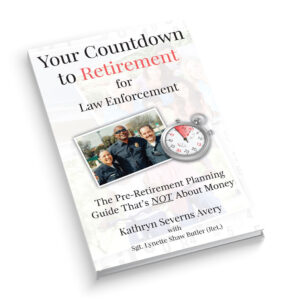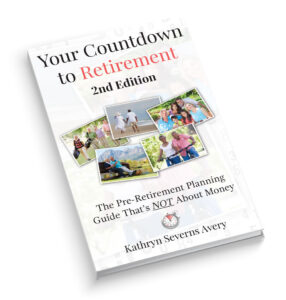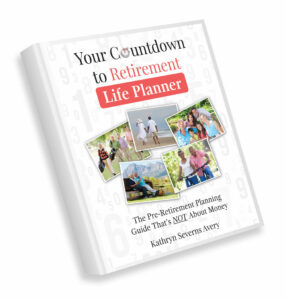It's Not Just About the Money!
A Final Gift From Mom
-
Author : Your Countdown to Retirement
Date : May 16, 2019
Category : Health and Wellness, Relationships, Retirement Planning
Comments : 0
Like : 0

By Kathryn Severns Avery
Several years ago my step-mother, Jacquie, died. At almost 94 years of age, it was not surprising she did not fare well after major surgery. Jacquie was an exceptionally caring, and generous person. Over the years she gave me many thoughtful gifts. But her final gift did more to provide support and comfort in that difficult time than I could have ever imagined. What was that gift? A well thought out, detailed, plan.
Jacquie discussed with me and with her sons where we would find all of the information needed at the time of her passing. She wrote her own obituary which spared her survivors any lingering doubts we might have omitted important information about her life. She indicated her preference for burial arrangements. A document specifying the division of property eliminated any potential squabbling over ownership of treasured possessions.
Jacquie knew that it was my intention to have my father, who has dementia, come and live with me and my husband. She had a list of his medications, dosages, and times to take them. She also left me contact information for his doctors. Every detail to make the transition from life with her to life without her was well thought out, documented and placed in a location she made known to her family.
My stepmother was always after my father to work with her to downsize and get rid of possessions they were not using or would not need in the future. By so doing, she sought to ease the burden of disposing of possessions. That being said, it took our family five days of working flat out to sort, divide, and dispose of what was left in their apartment.
Now that I know from first-hand experience the value of preparing and planning ahead for end of life issues, I am hard at work making sure my wishes are known and I have started the process of getting rid of things I don’t use in a responsible way. I am determined the disposition of my assets and possessions will not be a burden for my family.
Here are three things you can do to minimize “stuffication” (being suffocated by your “stuff “):
1. Regularly schedule purging of possessions
My husband, Chris, and I have lived in our home in Colorado for 11 years. There are still boxes in our basement we never unpacked. If we haven’t used something in 11 years how can we possibly justify storing it? We can’t. It is time to sell, donate, or throw it out. The best way to stay on top of purging possessions is to schedule time to do it. Designate one day a month, like the first Saturday, and stick to your schedule until you are satisfied with your results.
2. When you let possessions go, don’t replace them.
Whenever I am shopping, either alone or with my husband, and there is an item that catches our eye before buying it I ask the following two questions: Where is it going to go? What are we going to get rid of to make room for this? This prevents us from acquiring things that we don’t really need.
3. Determine what is worth selling and what is not
Your excess possessions have value, some more so than others. Craigslist, Ebay, Facebook, Pinterest, and garage sales are places you can sell your more valuable, unneeded, items. If you donate items to charity, make sure to keep a list of your donations so you deduct their value from your income taxes.
Developing a strategy for organizing your end-of-life affairs can be daunting. If you or your loved one is ready to start on this organizational process, but are needing a little guidance, please visit us at our What’s Next for Boomers? Life Planning Center or contact us here.
Subscribe to YCTR!
Latest Blog Posts





